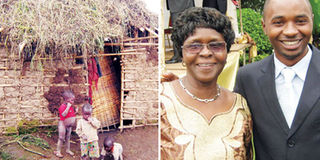Anthony Ayebare has improved the lives of the Batwa

Fresh from school and torn between employment and humanitarianism, the then 23-year-old Ayebare chose the latter and brought a difference to the lives of the Batwa, writes Dennis D. Muhumuza.
After his university studies, Anthony Ayebare found himself on the crossroads: should he get a city job like many of his colleagues, or return to his rural village to help the vulnerable community there? After much contemplation, he took the road less travelled and as the famous Robert Frost poem says, “And that has made all the difference”.
It has made the difference among the Batwa surrounding the Echuya Forest in Kabale District, where this 26-year-old hails. The Batwa, according to the online encyclopaedia, Wikipedia, are pygmy people said to be the oldest recorded inhabitants of the Great Lakes region of central Africa. They are presently found in Rwanda, Burundi, Congo and Uganda. In Kabale, Kanungu and Kisoro, the Batwa, now a significant minority, were driven out of their habitual forest lands of Bwindi and Echuya forests when they were made national parks. Homeless, they were forced to lurk around, suffering untold poverty, begging for a living, diseased, illiterate and stigmatised.
In 2007, Ayebare was impelled to reach out to them by founding the Global Batwa Outreach (GBO) to advocate for their rights, empower and help them find acceptance. “I grew up seeing them killed by mobs for petty offenses, saw them carry heavy loads of firewood to the Bakiga families in exchange for food, saw them work as guards on non-Batwa gardens, their children as herds boys. I didn’t question these practices because it appeared normal. Like many others, I thought the Batwa were like animals; what I saw was sub-human people who lived in the forest with wild animals.”
Ayebare sighs heavily and shakes his head: “People believed and still believe that the Batwa possess magical powers, a reason people, mostly in the Congo, believed eating them conferred magical powers onto them. When I developed a painful backache in 2004, I was advised to seek the magical powers of the Batwa to get healed.
It’s alleged that once one walks over a Mutwa while he or she is lying down, the backache gets cured. I needed to get cured, so I did walk over a child whose mom was my mother’s friend. I did not get cured; not only did the pain remain, it accelerated until I sought medical help. This pushed me into a world of questioning; I wanted to see any person claim they had gotten cured.
In a quest for answers, I landed on another disturbing brutal fact – the non Batwa elders had carefully crafted the backache myth as a way of getting free sex from Batwa women. Relying on the common misconception that sex helps get rid of backache and aware of the free availability of the Batwa women for sexual exploitation, they took advantage”. Such was the exploitation that existed, coupled with other injustices against the Batwa that broke my heart. I decided to do something.”
Just three years after the community-based organisation was founded, the welfare of the Batwa has improved and the way they are treated changed. Small-plot gardening and rearing chicken have not only had an entire Batwa school of about 130 pupils fed, but also come with some economic empowerment and good health to the parents and their hitherto malnourished children.
“We have started bee-keeping projects, given them dairy goats, pigs, plants, seeds, gardening tools, clothing, land and built them homes and toilets. But most significantly, we are educating the local community to accept the Batwa and treat them humanely,” says Ayebare.
Ugandan lawyer and human rights activist, Brian Bwesigye, after seeing what Ayebare has done for the underprivileged group, wrote on his Facebook page that, “Ayebare’s work in relation to the empowerment of the Batwa people can only be ignored by a deaf and blind man.”
But for this son of a primary school teacher and peasant mother, it has not been easy, considering the ridicule from some of his university colleagues who think he deserves better than “wasting” his future among pygmies. Local politicians too have not helped, but associate with GBO projects while campaigning, not forgetting some of the Batwa who would rather booze and abuse drugs than be helped. Ayebare has however soldiered on with the encouragement of his mother.
“While the rest of the community saw an opportunity to use the available cheap or free labour of the Batwa exploitatively,” he says, “My mother saw an opportunity to lend them land on a seasonal basis so they can plant crops.”
Ayebare threw a Christmas bash for over 430 Batwa families. His New Year resolution is to make operational the health centre that he has built to provide free healthcare to all Batwa.
This pragmatic Human Resource Management graduate of Makerere University may not have attained his childhood dream of becoming a catholic priest after studying at St Paul’s Seminary Rushoroza, but as the Executive Director of GBO, he’s doing a whole lot better shepherding the Batwa of south-western Uganda.




